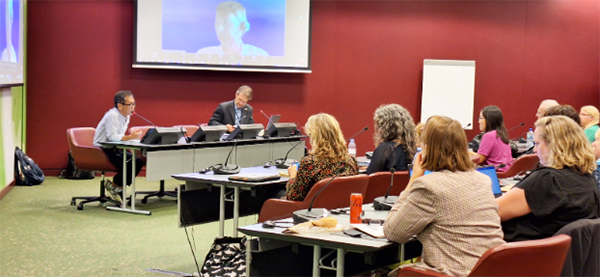The SEAFDEC Secretary-General, Ms. Malinee Smithrithee, accompanied by Policy and Program Coordinator, Dr. Worawit Wanchana, and Senior Policy Officer, Ms. Pattaratjit Kaewnuratchadasorn, took part in the 32nd Meeting of Animals Committee (AC32) of the Convention on International Trade in Endangered Species of Wild Fauna and Flora (CITES) on 19–23 June 2023 in Geneva, Switzerland. The AC32 was attended by CITES Animal Committee members from six geographical regions (Africa, Asia, Europe, North America, Central and South America and the Caribbean, and Oceania), observer parties and organizations. The AC meetings are convened twice between the meetings of the Conference of the Parties (CoP); and the AC report to the CoP meetings and provide advice to the Standing Committee, as requested.
During the AC32, the discussions focused on CITES trade regulations and compliance, capacity building, and other relevant topics. The AC32 also reviewed the species-specific matters of animals listed in the CITES Appendices including aquatic species (e.g. sharks and rays, eels, sea cucumbers, seahorses, marine ornamental fishes, etc.). Moreover, in-session working groups were established during AC32 to discuss specific topics including captive breeding, stony corals, sharks, nomenclature, and Review of Significant Trade. With regard to aquatic species, SEAFDEC participated in the in-session working group on sharks where more specific issues on sharks and rays were discussed and recommendations were drafted for consideration by the AC32 and further submission to the Standing Committee. In addition, SEAFDEC also expressed interest to join the inter-session working groups on eels and seahorses which will be organized after the AC32.
Furthermore, SEAFDEC served as one of the panelists at the side event organized by FAO titled “Needs and Solutions to Enable Parties to Service CITES Provisions for CoP19 Listed Commercially Exploited Aquatic Species” on 19 June 2023. SEAFDEC also shared information on measures implemented by the Southeast Asian countries in managing and conserving shark resources and fisheries, current status of the management and conservation of sharks and rays in the region, and regional needs in the form of building capacity and finances.
 SEAFDEC Southeast Asian Fisheries Development Center
SEAFDEC Southeast Asian Fisheries Development Center




